Cross of Iron Blu-ray Movie
HomeCross of Iron Blu-ray Movie 
Hen's Tooth Video | 1977 | 133 min | Rated R | Oct 23, 2018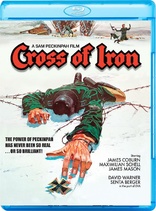
Price
List price:Amazon: $26.43 (Save 12%)
Third party: $26.43 (Save 12%)
Only 6 left in stock (more on the way).
Movie rating
7.7 | / 10 |
Blu-ray rating
| Users | 0.0 | |
| Reviewer | 4.0 | |
| Overall | 4.0 |
Overview
Cross of Iron (1977)
German officers and soldiers retreating from the disastrous Russian front engage in both camaraderie and bitter rivalries.
Starring: James Coburn, Maximilian Schell, James Mason (I), David Warner, Klaus LöwitschDirector: Sam Peckinpah
| Drama | Uncertain |
| War | Uncertain |
| Action | Uncertain |
Specifications
Video
Video codec: MPEG-4 AVC
Video resolution: 1080p
Aspect ratio: 1.84:1
Original aspect ratio: 1.85:1
Audio
English: DTS-HD Master Audio 2.0 Mono (48kHz, 24-bit)
French: Dolby Digital 2.0 Mono
Subtitles
English SDH
Discs
Blu-ray Disc
Single disc (1 BD)
Playback
Region A (B, C untested)
Review
Rating summary
| Movie | 3.5 | |
| Video | 4.0 | |
| Audio | 4.0 | |
| Extras | 5.0 | |
| Overall | 4.0 |
Cross of Iron Blu-ray Movie Review
Foot Soldiers
Reviewed by Michael Reuben October 28, 2018Director Sam Peckinpah will forever be known as the choreographer of bloody ballets of
mayhem in The Wild Bunch
(1969), which
permanently transformed how violence was depicted
on the screen. Though director Arthur Penn had arguably beaten him to the punch with Bonnie
and Clyde (1967), there was a unique poetry to Peckinpah's style that proved irresistible to
cinematic successors like John Woo and Quentin Tarantino. Maybe it was a sense of the director's own spirit filtering through
the
screen. Peckinpah was a skilled and demanding craftsman, but he was also an outsized
personality with a volcanic temper that he indulged freely with his casts and crews and even
more so with producers and studio executives. His excesses grew with his indulgence in alcohol
and cocaine. Working with him was, for many, an endurance contest. (And yet some, like James
Coburn and David Warner, continued to sign on.)
But despite Peckinpah's inextricable association with violence on film, his attitudes toward the
subject in reality were complex. More often than not, his violent heroes were figures of a romanticized past,
men (always men) on the edge of a civilization long gone by, for whom violence was necessary
for survival: Pike Bishop and his
gang of cast-off ex-soldiers; Cable Hogue in his isolated
outpost; the ambivalent adversaries of Pat
Garrett and Billy the
Kid; the melancholy ex-marshal
and equivocal partner in Ride the High
Country. Even Dustin Hoffman's modern-day
marshmallow-turned-vigilante in Straw
Dogs was
not a man who lived for violence—indeed, the
opposite. For Peckinpah's heroes, violence was typically forced upon them. Those who enjoyed
it for its own sake always came to bad ends, like the members of Deke Thornton's raggedy posse
in The Wild Bunch.
So when Peckinpah set out to make a war film—the only one of his career—he didn't choose a
typical story. There are plenty of films by American directors about the heroic Allied efforts in
World War II, and more will no doubt be made, as the so-called "Greatest Generation" recedes
further into an idealized past. But Peckinpah chose to set his war epic among German soliders,
not Nazis but regular infantry men: ordinary Joes (or, I suppose, Fritzes) who were simply
struggling to survive far from home in impossible circumstances. The film's source was a Fifties
German novel, The Willing Flesh, by author Willi Heinrich, who drew from his own experiences
in the disastrous German invasion of Russia, where casualties were astronomical and Heinrich
himself was wounded multiple times.
Casting the film with mixed nationalities, Peckinpah boldly offered it as an argument that, in the
modern era, nations no longer matter. War has become a mechanized and barely organized
slaughter of soldiers and civilians, all of whom are caught in the machinations of distant
decision-makers enacting "policy". (Peckinpah was no doubt influenced by the recently
concluded Vietnam War, which the director joined millions of Americans in loudly opposing.)
Cross of Iron did poorly in the U.S., where audiences were not yet ready to sympathize with
German military men, but it fared much better in Europe, where it was hailed by many (including
Orson Welles) as one of cinema's great anti-war statements. The film has gradually been
rediscovered by American fans, including Tarantino, who has cited it as an influence on
Inglourious Basterds.
On Blu-ray, a Region B-locked edition of
Cross of
Iron was previously issued in the U.K. by
Optimum Home Entertainment. Specialty publisher Hen's Tooth is now releasing a new Blu-ray
in Region A with the same rich assortment of extras provided by Optimum, plus an invaluable
commentary that Hen's Tooth recorded for its 2006 DVD.
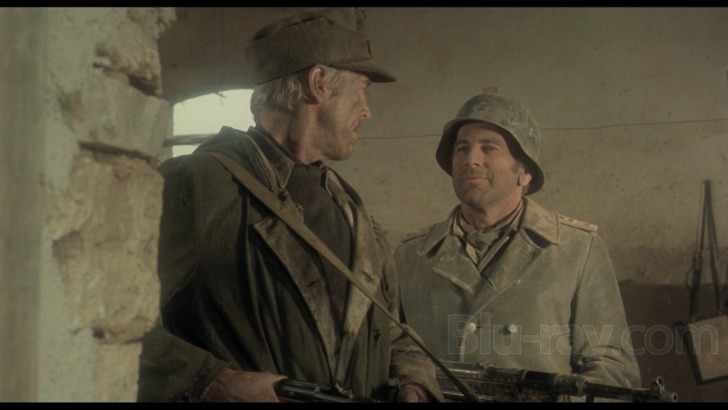
The central figure in Cross of Iron—the hero, if there is one—is Sergeant Steiner (James Coburn), the respected leader of a platoon that is part of the ignominious German retreat through the Taman Peninsula in 1943 after the failed siege of Stalingrad. Steiner has already been awarded the Iron Cross, the German military's highest honor for valor, but he is too jaded to put much stock in medals. At one point in the film, he rips it off his chest and throws it down, declaring it "a piece of worthless metal". Despite everything he has experienced, though, Steiner remains a dedicated soldier. "Men like him are our last hope", declares Captain Kiesel (David Warner), adjutant to the senior officer in the field, Colonel Brandt (James Mason).
An entirely different personality is a new arrival, the smug Captain Stransky (Maximillian Schell), who requested a transfer from his relatively safe posting in France to the rigors of the eastern front because he believes that is his best opportunity to win his own Iron Cross. Stransky wants the medal to add to his résumé like an ambitious high school student collecting extra-curriculars for a college application. Born of noble Prussian blood, he has convinced himself that men like him are the future saviors of Germany, and Stransky is preparing for his imagined place in the post-war order. One of the many problems with this plan is that Stransky has no real fighting experience, and he's a coward on the battlefield. Instead, he attempts to win the Iron Cross through blackmailing subordinates into giving false accounts of his valor, thus further lowering himself in the eyes of his fellow officers and soldiers—especially Steiner.
Conflict between Steiner and Stransky provides the narrative spine of Cross of Iron, but for long stretches of the film, their rivalry is subsumed in other concerns. Steiner's platoon is filled with a typical war film's array of colorful personalities, each with his own peculiarities and characteristics, and lengthy battle sequences churn up extended chaos on the screen. At about the midpoint of the film, Steiner is wounded and awakens in a military hospital, where he is attended by Eva (Senta Berger), a sweetly loving German nurse with whom he has an affair as he recovers. But the moment Steiner is fit for active duty, he leaves Eva in tears and returns to his comrades on the front. For him, those are the only emotional bonds that matter anymore. "Women are no more than nuisance", Stransky declares. "Sometimes necessary." It's one of the few points on which the two enemies agree.
Battles and operations come and go in Cross of Iron, but the action lacks the clarity of a conventional war film, which is typically focused on a specific objective (e.g., blowing up a bridge, finding Colonel Kurtz, evacuating Dunkirk or saving Private Ryan). In Peckinpah's account, survival is the sole objective, and every new operation or order is just another opportunity to be killed, whether by the enemy, the civilian population or friendly fire. As a result, the narrative sometimes appears to wander, and it can take several viewings to absorb all of the character beats, plot details and individual moments of drama that Peckinpah has tucked into the folds of the action. (According to the extras, the editing was a lengthy affair, because the director shot enough footage to make a film several times the final running time of 133 minutes.) In the end, though, we come down to Stransky and Steiner, with the latter leading the bewildered major onto a hellish battlefield, where Steiner promises to show him "where the Iron Crosses grow".
Peckinpah opens the film with a montage of World War II photos (with a children's nursery rhyme in voiceover), but he ends with a photo array drawn both from that war and from subsequent conflicts around the world, as if to underscore that Steiner and others like him will continue to be thrown into the meat grinder of battle for reasons they do not understand and causes they do not share. The film ends with a famously despairing quote from Bertolt Brecht's The Resistible Rise of Arturo Ui, written in 1941:
Don't rejoice in his defeat, you men.
For though the world stood up and stopped the bastard,
The bitch that bore him is in heat again.
Cross of Iron Blu-ray Movie, Video Quality 
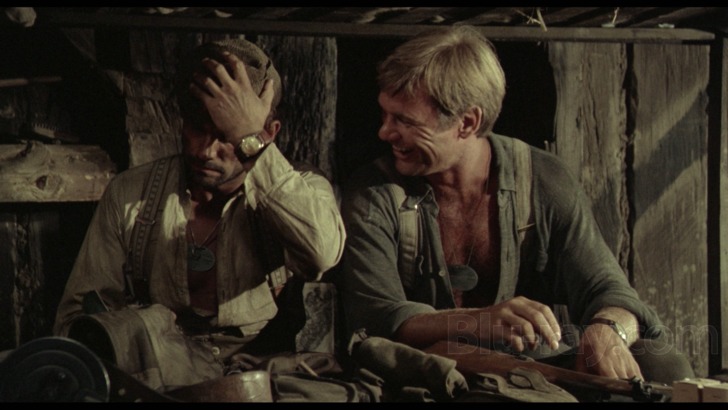
Cross of Iron was shot by Peckinpah's Straw
Dogs cinematographer, John Coquillon, who also
photographed Pat Garrett and Billy the
Kid. Shooting
under challenging conditions in
Yugoslavia, with limited resources and the film's producer routinely on the verge of bankruptcy,
Coquillon and the rest of the creative team created a nearly monochromatic image from the dark
earth tones of the battlefields, the dusty soldiers' uniforms and the faces routinely covered in
mud. When bright hues sometimes intrude—usually red from blood or the incongruous Nazi
flag at the hospital where Steiner recovers or the blanket stretched across his hospital bed—they
seem almost out of place.
Hen's Tooth has confirmed that the transfer used for their 1080p, AVC-encoded Blu-ray is the
same one created by Studiocanal and used by Optimum for the 2011 Region B-locked disc
previously reviewed by Blu-ray.com.
The image on the
new Blu-ray reflects the same virtues
described on the earlier disc: a film-like appearance with a natural and well-resolved grain
structure and no indication of DNR or filtering; consistent contrast levels and densities; and only
an occasional, barely noticeable hint of sharpening in some of the darker scenes. Studiocanal did
a nice job removing dirt, scratches and other age-related damage, and Hen's Tooth Blu-ray reaps
the advantages of their efforts. The only issue that distinguishes the new Blu-ray from its Region
B predecessor is more aggressive compression, with Hen's Tooth's bitrate averaging 18.00
Mbps, compared to Optimum's 31.99. The compressionist appears to have done a capable job,
but there is no obvious reason to strive for such tight constraints when there's a vast expanse of
unused space (over 10 GB) on the BD-50.
Cross of Iron Blu-ray Movie, Audio Quality 
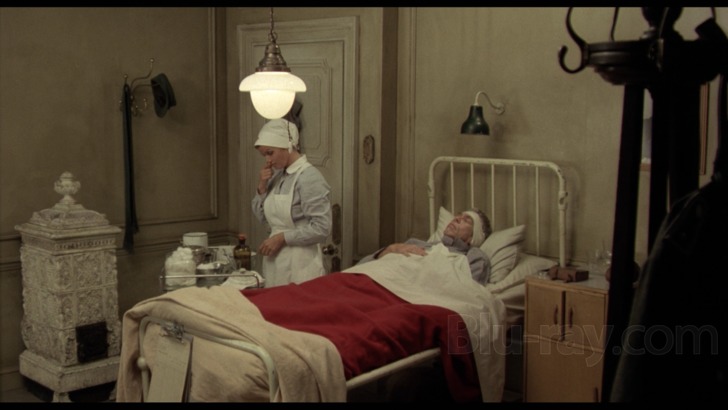
Cross of Iron's mono soundtrack has been encoded as lossless PCM 2.0, using, I suspect, the same digital files previously utilized by Optimum. It's a strong mono track, especially given the film's limited budget, and while the sound mix may not shake the room, it amply conveys the layers of sonic chaos during scenes of battle. The dialogue is clearly rendered and correctly prioritized (no small achievement when it has to contend with weapons fire, multiple explosions and collapsing fortifications), and the track is free of any clicks, pops, dropouts or extraneous noise.
Cross of Iron Blu-ray Movie, Special Features and Extras 
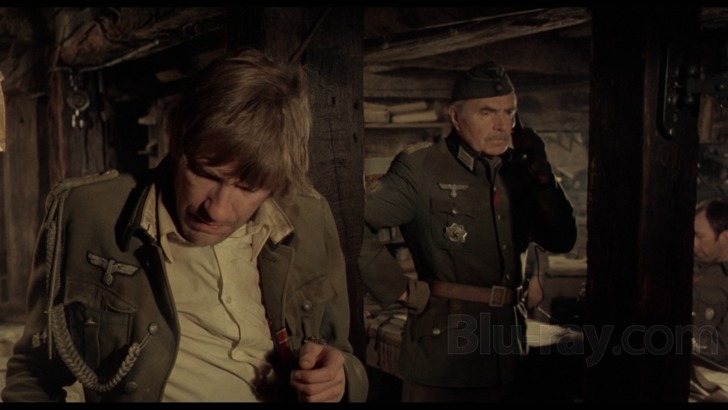
The extras largely match those included with the 2011 Region
B Blu-ray. The most significant
addition is the informative commentary, which has been ported over from Hen's Tooth's 2006
DVD.
- Commentary by Film Scholar Stephen Prince: Prince is the author of Savage Cinema:
Sam Peckinpah and the Rise of Ultraviolent Movies, although this commentary was
recorded for Hen's Tooth's DVD before the book's publication in 2010.
Prince clearly came prepared, and you can often hear the shuffling of papers as he works through his notes. He speaks quickly and continuously, and his commentary is packed with information about both the film's story and the director's cinematic technique. One of the most interesting of the commentary's many threads is Prince's detailed comparison of the film to the novel from which it was adapted. As an examination of both Cross of Iron and its director's career, this is an invaluable resource. - Passion and Poetry: Sam Peckinpah's War (1080p; 1.78:1; 47:57): This 2011 documentary was made by Mike Siegel, who has created an entire series of documentaries and video shorts chronicling Peckinpah's life and work. It includes contemporary interviews with actors David Warner, James Coburn, Senta Berger, Vadim Glowna, Roger Fritz, biographer David Weddle and production associate Katy Haber, as well as archival interviews with Coburn, James Mason, Maximillian Schell, producer Wolfgang Hartwig, and Peckinpah himself. In English and subtitled German.
- Kruger Kisses Kern (1080p; 1.66:1; 8:49): In this short featurette directed by Siegel, actor Vadim Glowna describes his complicated relationship with Peckinpah and the origin of one of the film's most memorable (and bizarre) scenes. In German with English subtitles.
- Letters from Vadim & Sam (1080p; 1.66:1; 3:57): This featurette builds on the previous one, in which Glowna relates how Maximillian Schell suggested he write the director a letter after a blowup between them. These are excerpts from the correspondence that developed.
- Vadim & Sam: Father & Son (1080p; 1.66:1; 6:03): Further memories and reflections by Glowna on his fraught relationship with Peckinpah, both during and after filming Iron Cross. In German with English subtitles.
- Cutting Room Floor (1080p; 1.66:1; 4:24): Actor Roger Fritz recalls a visit to Peckinpah's editing suite for the film. Fritz, David Warner and Senta Berger describe several of the deleted sequences, illustrated by stills. In English and subtitled German.
- Mike's Home Movies: Steiner & Keisel Meet Again (1080p; 1.33:1; 7:35): Mike Siegel filmed these scenes at an Italian retrospective of Peckinpah's work that he helped assemble in 2000. David Warner and James Coburn are recorded at a pre-screening address, as they reminisce about the filming of Cross of Iron.
- Steiner in Japan (1080p; 1.33:1; 1:57): Ads filmed in 1977, when Coburn and Peckinpah accompanied the film for its Japanese premiere. In English and unsubtitled Japanese.
- On Location: Sam Peckinpah (1080p; 1.66:1; 5:20): This and the following four "On Location" segments are archival audio interviews, with the voice recordings played over montages of production and on-set stills. Excerpts are used in the "Passion and Poetry" documentary listed above.
- On Location: James Coburn (1080p; 1.66:1; 5:45).
- On Location: Maximillian Schell (1080p; 1.66:1; 4:47).
- On Location: James Mason (1080p; 1.66:1; 6:21).
- On Location: David Warner (1080p; 1.66:1; 3:23).
- German Trailer (1080p; 1.33:1; 3:21): In subtitled German. Note that the German title of the film was changed to "Steiner: Cross of Iron".
- US TV Spot (1080p; 1.33:1; 0:32).
- US/UK Trailer (1080p; 1.78:1, windowboxed; 3:52).
Cross of Iron Blu-ray Movie, Overall Score and Recommendation 
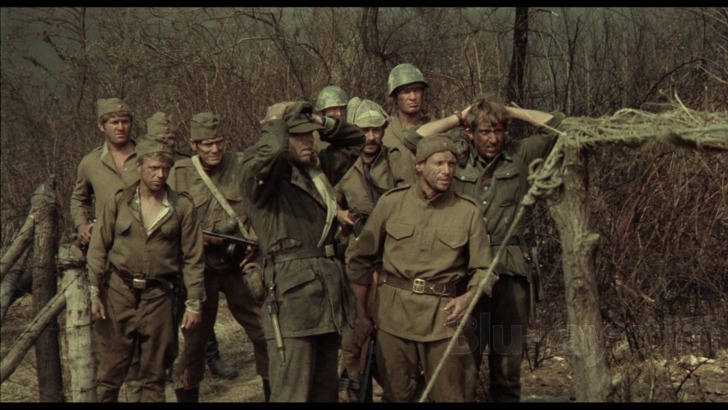
Peckinpah made only two more feature films after Cross of Iron before his death from heart failure in
1984 (at the age of 59). Neither of them,
Convoy and The Osterman Weekend, ranks among the
director's best work. His formidable gifts as a filmmaker were gradually eclipsed by alcohol and
drug abuse. Cross of Iron would become the last of the director's works to capture the fatalistic poetry of which he
was uniquely capable.
Hen's Tooth has finally made it available on Blu-ray in Region A in a creditable presentation loaded with extras, and their disc is
highly recommended.
Similar titles
Similar titles you might also like

The Longest Day
1962

Wings
1927

The Dirty Dozen
1967

Stalingrad
1993

The Thin Red Line
1998

A Bridge Too Far
1977

5 Days of War
2011

Platoon 4K
Collector's Edition
1986

Dunkirk 4K
2017

Paths of Glory
1957

9th Company
9 rota | Collector's Edition
2005

Battle of Britain
1969

My Way
마이웨이 / Mai Wei
2011

Overlord
1975

Fury 4K
2014

Windtalkers
2002

Attack!
Fragile Fox
1956

The Bridges at Toko-Ri
1954

Das Boot
The Director's Cut | Single-Disc Edition
1981

Too Late the Hero
1970